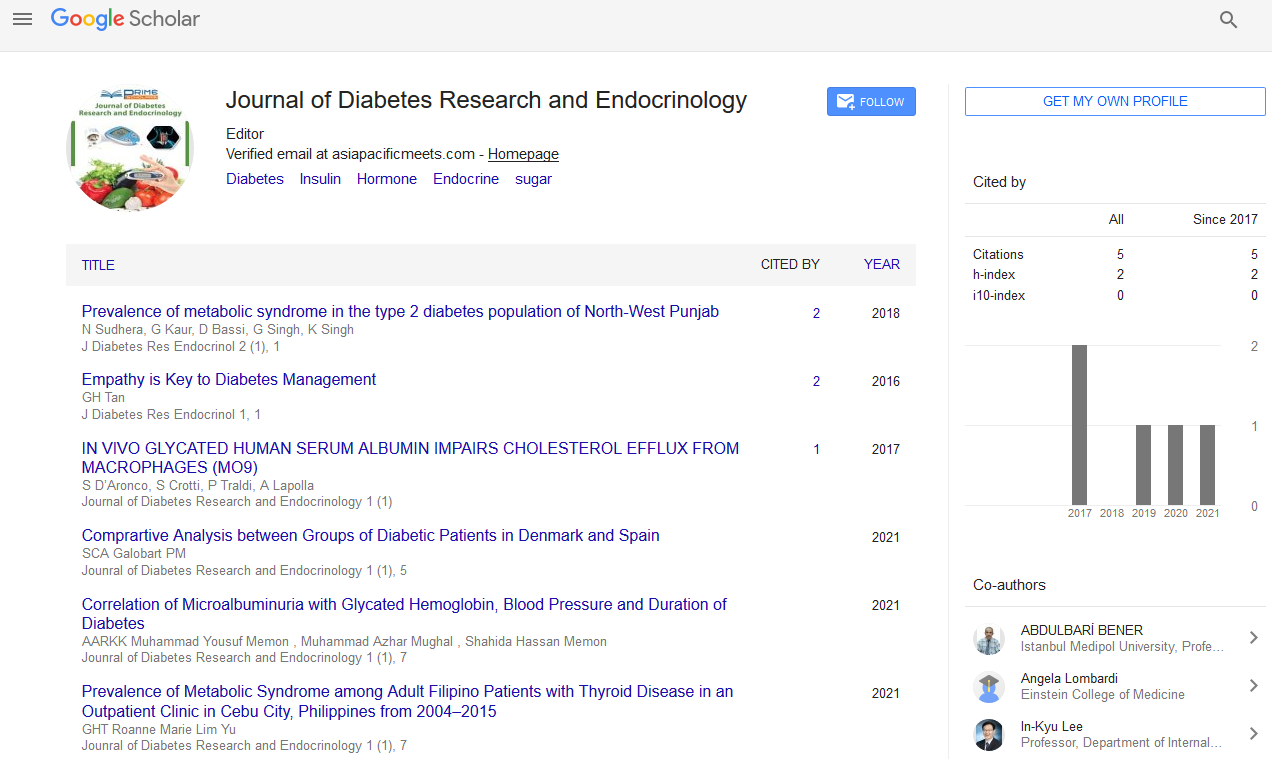Commentary - (2024) Volume 8, Issue 2
Managing Gestational Diabetes Through Diet
Edward Foster*
Department of Endocrinology, Stirling University, UK
*Correspondence:
Edward Foster,
Department of Endocrinology, Stirling University,
UK,
Email:
Received: 29-May-2024, Manuscript No. IPJDRE-24-20955;
Editor assigned: 31-May-2024, Pre QC No. IPJDRE-24-20955 (PQ);
Reviewed: 14-Jun-2024, QC No. IPJDRE-24-20955;
Revised: 19-Jun-2024, Manuscript No. IPJDRE-24-20955 (R);
Published:
26-Jun-2024, DOI: 10.36648/ipjdre.08.02.14
Description
Gestational diabetes is a form of diabetes that occurs during
pregnancy, characterized by high blood sugar levels that
can affect both mother and baby. Effective management of
gestational diabetes is crucial to ensure a healthy pregnancy
and to minimize complications. One of the most essential
strategies for managing gestational diabetes is through diet.
Proper dietary management can help maintain blood sugar
levels within a target range and promote the well-being of both
the mother and the developing baby. Gestational diabetes
occurs when the body cannot produce enough insulin to
regulate blood sugar levels during pregnancy. Insulin resistance,
a condition where cells do not respond well to insulin,
increases during pregnancy due to hormonal changes. This
resistance, combined with the increased demand for insulin,
can lead to elevated blood sugar levels. A balanced diet that
includes a mix of carbohydrates, proteins, and fats is essential
for managing gestational diabetes. Carbohydrates have the
most significant impact on blood sugar levels, so their type and
quantity must be carefully monitored. Carbohydrate counting
involves tracking the amount of carbohydrates consumed at
each meal and snack. This helps in planning meals that do not
cause significant spikes in blood sugar levels. Women with
gestational diabetes should aim for consistent carbohydrate
intake throughout the day. Foods with a low glycaemic index
are digested and absorbed more slowly, causing a gradual rise
in blood sugar levels. Examples of low GI foods include whole
grains, legumes, non-starchy vegetables, and some fruits.
Incorporating these foods into the diet can help maintain
stable blood sugar levels. Eating smaller, more frequent meals
can help manage blood sugar levels. Large meals can cause
blood sugar spikes, while smaller, balanced meals can provide
a steady supply of nutrients without overwhelming the body’s
insulin capacity. Including adequate protein and fibre in meals
can slow down the absorption of carbohydrates and prevent
rapid increases in blood sugar levels. Lean proteins such as
chicken, fish, beans, and legumes, as well as high-fibre foods
like whole grains, vegetables, and fruits, are beneficial. Start
the day with a balanced breakfast that includes protein, healthy
fats, and whole grains. For example, a breakfast of scrambled
eggs with whole grain toast and a serving of fresh fruit can
provide sustained energy without causing blood sugar spikes.
These meals should include a balance of lean protein, nonstarchy
vegetables, whole grains, and healthy fats. For instance,
a grilled chicken salad with a variety of vegetables, quinoa, and
a small amount of olive oil-based dressing can be a nutritious
and balanced choice. Healthy snacks can help maintain blood
sugar levels between meals. Options include a small apple with
peanut butter, a handful of nuts, Greek yogurt with berries, or
carrot sticks with hummus. Staying well-hydrated is important
for overall health and can help manage blood sugar levels.
Water is the best choice, but herbal teas and other non-sugary
beverages can also be included. Foods and drinks high in sugar,
such as sodas, candy, pastries, and desserts, can cause rapid
spikes in blood sugar levels and should be limited or avoided.
Refined carbohydrates like white bread, white rice, and pasta
have a high glycaemic index and can quickly raise blood sugar
levels. Opt for whole grain versions instead. Foods high in
unhealthy fats, such as fried foods and fast food, can contribute
to insulin resistance and should be consumed sparingly. Regular
monitoring of blood sugar levels is crucial for women with
gestational diabetes. Keeping a food diary and tracking blood
sugar responses to different foods can help identify patterns
and make necessary dietary adjustments. Collaborating with
a healthcare team, including a dietitian or diabetes educator,
can provide personalized guidance and support. Managing
gestational diabetes through diet involves careful planning and
mindful eating.
Acknowledgement
None.
Conflict Of Interest
The author’s declared that they have no conflict of interest.
Citation: Foster E (2024) Managing Gestational Diabetes through Diet. J Diab Res Endocrinol. 8:14.
Copyright: 2024 Foster E. This is an open-access article distributed under the terms of the Creative Commons Attribution License, which permits unrestricted use, distribution, and reproduction in any medium, provided the original author and source are credited.

